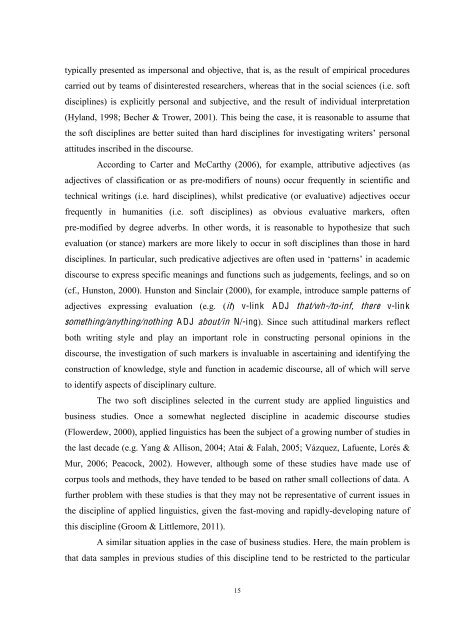Evaluative Meanings and Disciplinary Values - eTheses Repository ...
Evaluative Meanings and Disciplinary Values - eTheses Repository ...
Evaluative Meanings and Disciplinary Values - eTheses Repository ...
Create successful ePaper yourself
Turn your PDF publications into a flip-book with our unique Google optimized e-Paper software.
typically presented as impersonal <strong>and</strong> objective, that is, as the result of empirical procedures<br />
carried out by teams of disinterested researchers, whereas that in the social sciences (i.e. soft<br />
disciplines) is explicitly personal <strong>and</strong> subjective, <strong>and</strong> the result of individual interpretation<br />
(Hyl<strong>and</strong>, 1998; Becher & Trower, 2001). This being the case, it is reasonable to assume that<br />
the soft disciplines are better suited than hard disciplines for investigating writers personal<br />
attitudes inscribed in the discourse.<br />
According to Carter <strong>and</strong> McCarthy (2006), for example, attributive adjectives (as<br />
adjectives of classification or as pre-modifiers of nouns) occur frequently in scientific <strong>and</strong><br />
technical writings (i.e. hard disciplines), whilst predicative (or evaluative) adjectives occur<br />
frequently in humanities (i.e. soft disciplines) as obvious evaluative markers, often<br />
pre-modified by degree adverbs. In other words, it is reasonable to hypothesize that such<br />
evaluation (or stance) markers are more likely to occur in soft disciplines than those in hard<br />
disciplines. In particular, such predicative adjectives are often used in patterns in academic<br />
discourse to express specific meanings <strong>and</strong> functions such as judgements, feelings, <strong>and</strong> so on<br />
(cf., Hunston, 2000). Hunston <strong>and</strong> Sinclair (2000), for example, introduce sample patterns of<br />
adjectives expressing evaluation (e.g. (it) v-link A DJ that/wh-/to-inf, there v-link<br />
something/anything/nothing A DJ about/in N/-ing). Since such attitudinal markers reflect<br />
both writing style <strong>and</strong> play an important role in constructing personal opinions in the<br />
discourse, the investigation of such markers is invaluable in ascertaining <strong>and</strong> identifying the<br />
construction of knowledge, style <strong>and</strong> function in academic discourse, all of which will serve<br />
to identify aspects of disciplinary culture.<br />
The two soft disciplines selected in the current study are applied linguistics <strong>and</strong><br />
business studies. Once a somewhat neglected discipline in academic discourse studies<br />
(Flowerdew, 2000), applied linguistics has been the subject of a growing number of studies in<br />
the last decade (e.g. Yang & Allison, 2004; Atai & Falah, 2005; Vázquez, Lafuente, Lorés &<br />
Mur, 2006; Peacock, 2002). However, although some of these studies have made use of<br />
corpus tools <strong>and</strong> methods, they have tended to be based on rather small collections of data. A<br />
further problem with these studies is that they may not be representative of current issues in<br />
the discipline of applied linguistics, given the fast-moving <strong>and</strong> rapidly-developing nature of<br />
this discipline (Groom & Littlemore, 2011).<br />
A similar situation applies in the case of business studies. Here, the main problem is<br />
that data samples in previous studies of this discipline tend to be restricted to the particular<br />
15
















